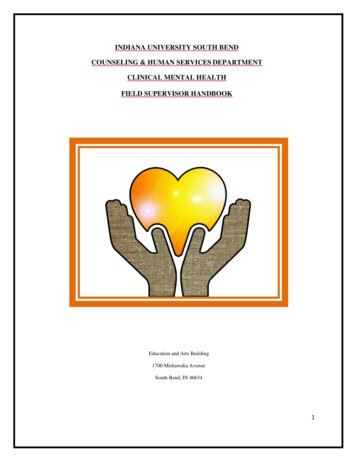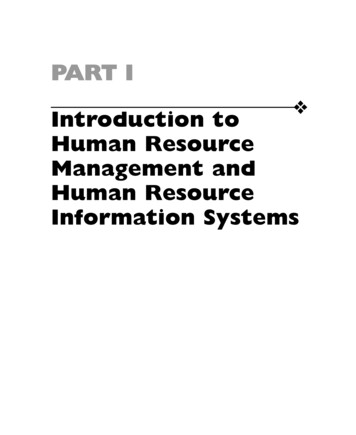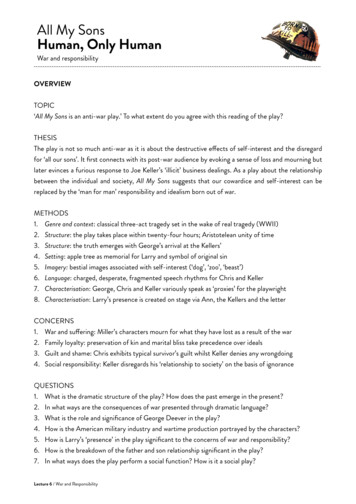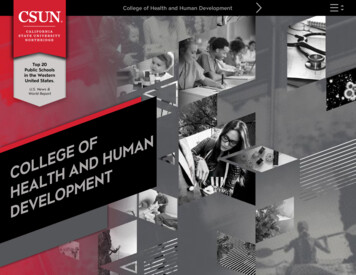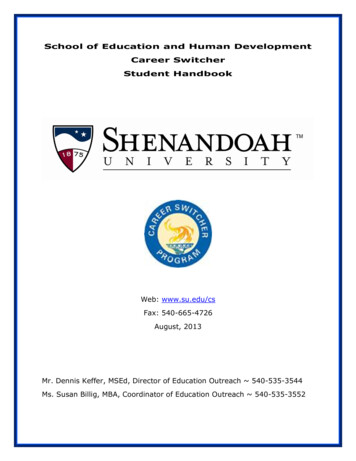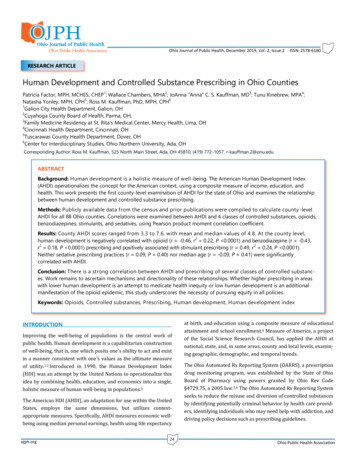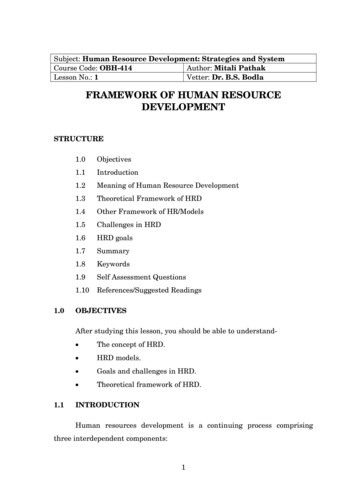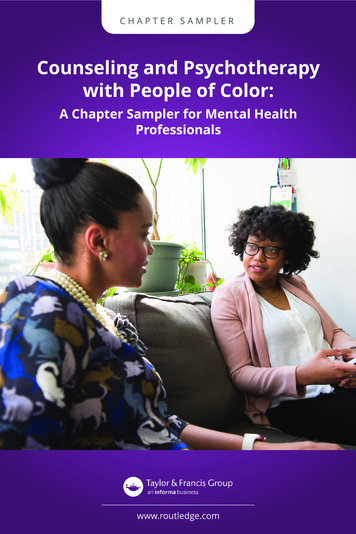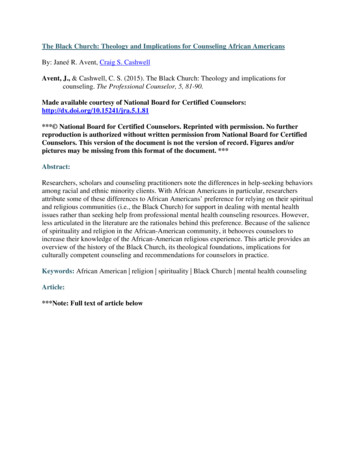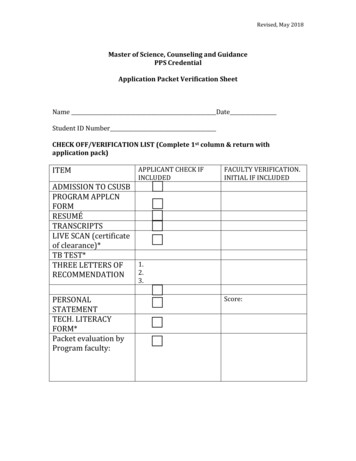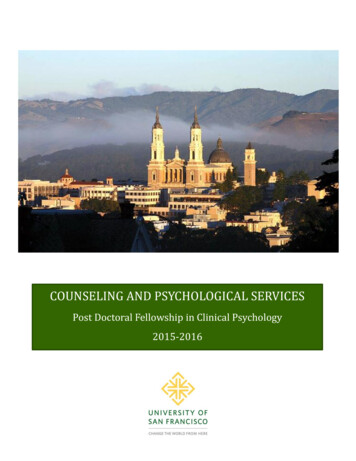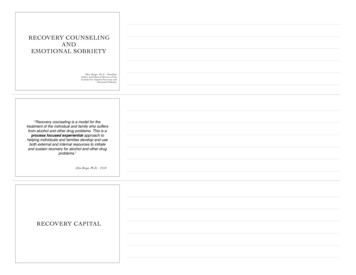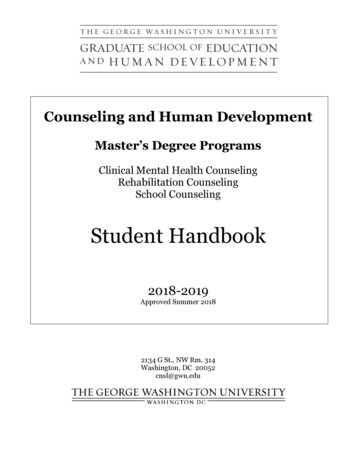
Transcription
Counseling and Human DevelopmentMaster’s Degree ProgramsClinical Mental Health CounselingRehabilitation CounselingSchool CounselingStudent Handbook2018-2019Approved Summer 20182134 G St., NW Rm. 314Washington, DC 20052cnsl@gwu.edu
2Master’s Degree Student HandbookTable of ContentsSection I: Overview of the Department of Counseling and Human DevelopmentIntroduction to the Department of Counseling and Human Development.5Statement of Philosophy .5Mission Statement .6Accreditation .6Openness to Diversity Expectations .6Counseling Faculty .7Program Objectives .9Admission Procedures .9Admission Requirements . 10Background Check . 10Advising. 10Program Transfers . 11Financial Assistance . 11Professional Organizations . 122016 CACREP Standards . 13Counselor Certification. 20Counselor Licensure . 21Ethical Standards . 21University Email . 21Student Listservs and Social Media . 22University Policies . 22Department of Counseling and Human DevelopmentThe George Washington University
3Master’s Degree Student HandbookThe Office of Student Life . 23Important Deadline Dates for Foggy Bottom Campus Students . 25Registration Policies and Procedures . 25Grading . 29Program Plans and Transfer Credits . 31Graduation and Commencement . 34Section II: The Curriculum and Clinical ExperienceMaster of Arts Degree in:Clinical Mental Health Counseling . 38School Counseling . 40Rehabilitation Counseling . 43Course Scheduling. 47Practicum Requirements . 47Community Counseling Services Center (CCSC): Philosophy and Purpose . 49Internship Requirements . 49Documentation of Practicum/Internship Hours. 50Department Policy for Practicum and Internship Extenders . 51Policies and Procedures for Formal Endorsement of Graduating Students for Professional Credentials. 51Procedures for Faculty Review of Counseling Students. 51Evaluations of Student Progress . 52Pre-Practicum Portfolio Requirements . 52Comprehensive Examination Procedures and Requirements. 55Department of Counseling and Human DevelopmentThe George Washington University
4Master’s Degree Student HandbookAppendicesAppendix A: Frequently Asked Questions . 57Appendix B: Counseling and Life Transitions Graduate Certificate Program. 60Appendix C: Job Development and Job Placement Graduate Certificate Program. 62Appendix D: Student Statement of Informed Consent . 64Appendix E: Academic Program Assessment. 66Department of Counseling and Human DevelopmentThe George Washington University
5Master’s Degree Student HandbookSECTION I: OVERVIEW OF THE DEPARTMENT OF COUNSELINGAND HUMAN DEVELOPMENTIntroductionThis Handbook is provided to all students enrolled in the master's degree programs in Clinical Mental HealthCounseling, Rehabilitation Counseling, and School Counseling of the Department of Counseling and HumanDevelopment at The George Washington University. This handbook is designed to serve as a resource andreference to answer a variety of questions and to assist you throughout the program. Its intention is to makeavailable to new students program information, including descriptions of various program options andrequirements, supplemental to The George Washington University Bulletin, and program expectations. Inaddition, the Graduate School of Education and Human Development (GSEHD) Handbook contains information,policies, and procedures which apply to students in the Counseling Programs.Statement of PhilosophyThe counseling faculty at The George Washington University affirms its commitment to counseling as aneffective, viable means of assisting individuals through normal development and in coping effectively withpersonal and social problems. The goal of the counseling program is to prepare highly knowledgeable and skilledprofessional practitioners to work in a variety of settings--schools, colleges and universities, and community andrehabilitation agencies. The practice of counseling is based on theory and research information, an understandingof ethical practices, and a set of professional and interpersonal skills. Concurrent and ongoing exposure toconceptual frameworks and informed practice is the basic curriculum model employed. It is recognized that aninteraction of those two components is essential.Professional counselors work in collaboration with other helping professionals, paraprofessionals, personnel, anda variety of self-help groups. Counseling students are encouraged to make maximum use of existing communityresources in assisting those whom they serve.In addition, the counselor, regardless of his/her theoretical stance, functions as a change agent. Effective andpositive change is brought about by assisting clients to examine and modify their behavior for more effectiveliving and by assisting clients to cope with, adjust to, or otherwise negotiate the environments affecting theirpsychosocial well-being.The counseling faculty, while representing a range of views, is in agreement that individual beliefs, theoreticalpatterns, and clinical/counseling skills must be fostered in graduate counseling students. Faculty membersrepresent an array of models and information that they make available to students to help them clarify their ownphilosophical, theoretical, and practical positions.An open atmosphere is recognized as necessary to allow students to fully explore professional issues. Closelyrelated to this atmosphere is a view-point emphasizing self-awareness and personal value clarification regardingsuch issues as the nature of humanity and the meaning of life.An interdisciplinary approach is espoused to counselors. All the behavioral and social sciences are considered asimportant to the understanding of the complexity of human behavior. Thus, the counseling faculty presentsinformation and methodology from a range of disciplines.Department of Counseling and Human DevelopmentThe George Washington University
6Master’s Degree Student HandbookThe faculty is in agreement that the emphasis of the program must be respectful of the uniqueness of theindividual. There must be caution to avoid molding people into the status quo. Typical stereotypes can lead toexpectations that can detract from individual growth. Personal strengths must be brought into focus.The faculty encourages applications from a wide variety of personal, social, ethnic, cultural, and educationalbackgrounds. It recognizes the need to prepare professional counselors, supervisors, administrators, and such toserve a diversified and varied population of clients.Mission StatementThe mission of the GWU graduate programs in Counseling is to excel in providing the preparation of professionalpractitioners, researchers and scholars, and leaders in professional counseling for diverse populations in variededucational and human service settings across the life-span; to encourage and conduct research and scholarship tobuild the body of knowledge in counseling; and to provide and encourage professional and community serviceand leadership for the welfare of individuals, society, and the counseling profession.The faculty, students, and staff of the graduate programs in Counseling are guided by their commitment to (1) theprimacy of the client’s dignity and welfare, (2) multicultural understanding and development, (3) respect forhuman diversity and human rights, (4) ethical and social responsibilities, (5) excellence in teaching, scholarship,and clinical supervision, (6) individualized advising, mentoring, and supervision, (7) service for the betterment ofsociety and our various communities, and (8) leadership and service to the counseling profession.AccreditationThe graduate programs in the Department of Counseling and Human Development are approved by the Councilfor Accreditation of Counseling and Related Educational Programs (CACREP) under the 2009 standards forClinical Mental Health Counseling, School Counseling, and Counselor Education and Supervision programs. Thisaccreditation is effective until 2021. Effective July 1, 2017, the Council for Accreditation of Counseling andRelated Educational Programs (CACREP) assumed responsibility for the continued accreditation of theRehabilitation Counseling programs.Openness to Diversity ExpectationsThe Master’s Program in Counseling is committed to recruiting a diverse student body representing a wide arrayof cultures, geographical regions, and socioeconomic backgrounds. The unique experiences and perspectivesstudents bring to the master’s program present possibilities for learning not only for individual students but alsofor their peers.By accepting the invitation to enter the Master’s Program in Counseling, students commit to the ongoingdevelopment of their understanding of their own prejudices and preconceptions and developing theircomprehension of the perspectives and lived experiences of diverse human beings. Students also accept thechallenge to develop their acceptance of others and to learn to communicate more effectively with diverse humanbeings.Counselors strive to acknowledge other belief systems based on religion, culture, disability, gender identity,socio-economic status, nationality, language or geographic diversity. In addition, counselors strive toacknowledge other world views, values and belief systems. Thus, counseling students entering the program atGWU are bound by the American Counseling Association’s (ACA) Code of Ethics, the ethical principles andguidelines developed by divisions of ACA (such as the American Mental Health Counselors Association,Department of Counseling and Human DevelopmentThe George Washington University
7Master’s Degree Student HandbookAmerican Rehabilitation Counseling Association), and other related associations such as the Commission onRehabilitation Counselor Certification (CRCC), and the American School Counselor Association (ASCA).Counseling FacultyScott Beveridge, Ph.D., LCPC-S, CRC, CDMS, ABVE-DAssociate Professor of CounselingResearch and Professional Interests: Disability and employment; vocational rehabilitation outcomes. Jobdevelopment and job placement; Web-based instruction, learning, and training; distance learning researchand development.Teaching Areas: Foundations of rehabilitation counseling, disability case management, careercounseling, job placement and supported employment, theory and techniques of counseling.Theoretical Orientation: Cognitive-behavior therapy.Sara Cho Kim, PhDAssistant Professor of CounselingResearch and Professional Interests: Multicultural counseling, health disparities in Asian immigrantpopulations, intergenerational transmission of war trauma, and cultural identity development in childrenand adolescents.Teaching Areas: Advanced Leadership and advocacy, Counseling Interview Skills, Internship/Practicum,and Career Counseling.Theoretical Orientation: Cognitive behavioral and Integrative with a multicultural focusElizabeth Crunk, PhD, NCCAssistant Professor of CounselingResearch and Professional Interests: Grief and loss, death and dying, and suicide bereavement; selfmanagement strategies for coping with chronic conditions; psychometrics and instrumentdevelopment; interpersonal neurobiology; and psychotherapy process and outcome studies.Teaching Areas: Lifespan and Adult Development, Practicum, Grief and Loss, Counseling Skills, GroupCounseling, and Child-Centered Play Therapy.Theoretical Orientation: Integrative and client-tailored practice from a theoretical lens of constructivism(e.g., narrative reconstruction and coherence).Rebecca Dedmond, PhD, LPCAssociate Professor of Counseling and Coordinator, School Counseling program, Alexandria Graduate EducationCenterResearch and Professional Interests: Education Leadership; school counseling; career counseling; careerdevelopment theory and counseling techniques with youth. Government Relations.Teaching Areas: Career development/career counseling, School counseling/practicum and internship.Theoretical Orientation: Eclectic; Reality Therapy.Jorge Garcia, PhD, CRC, LPCProfessor of Counseling and Coordinator, Rehabilitation Counseling programResearch and Professional Interests: Multicultural aspects of rehabilitation counseling, ethical decisionmaking models in counseling.Department of Counseling and Human DevelopmentThe George Washington University
8Master’s Degree Student HandbookTeaching Areas: Social and cultural dimensions of counseling, ethics in counseling, Advancedmulticultural counseling and research, medical and psychological aspects of rehabilitation counseling,advanced theories in counseling.Theoretical Orientation: Integrative (CBT and humanistic).Kenneth C. Hergenrather, PhD, CRCProfessor, Counseling and Human DevelopmentResearch and Professional Interests: Program evaluation, employment, HIV/AIDS, LGBT counseling.Teaching Areas: Research methods, assessment, counseling skills, internship, advanced theories incounseling.Theoretical Orientation: Theory of Planned Behavior; Hope theory, Social Cognitive Theory, Transtheoretical Model and Stages of Change.Richard P. Lanthier, PhDAssociate Professor of Human Development and Coordinator, Counselor Education and Supervision doctoralprogramResearch and Professional Interests: Measurement of personality in children and adolescents; academicand behavioral adjustment of youth; parent involvement in adolescents’ lives; social relationships inadolescents and young adults; research methods and statistics.Teaching Areas: Human Development, personality theory and research, social development, and personalrelationships.Sylvia A. Marotta-Walters, PhD, ABPP Lic: MD, DC in Psychology; LPC - DCProfessor of Counseling and Department ChairResearch and Professional Interests: Trauma and stress; developmental consequences of trauma;posttraumatic growth; evidence-based treatments for complex trauma.Teaching Areas: Family counseling, Trauma and Crisis Intervention; Doctoral internship in counseling.Theoretical Orientation: Development in context - an integrated systemic approach.Maureen McGuire-Kuletz, EdD, CRCAssociate Professor of Counseling. Co-Director of GW Center for Rehabilitation Counseling Research andEducation, and Coordinator, On-Line Rehabilitation Counseling ProgramResearch and Professional Interests: Disability, Blind and Vision Services, Professional Ethics forCounselors, Disability and Poverty, Distance Learning: Web-Based InstructionTeaching Areas: Internship, Medical and psychosocial aspects of disability; foundations of rehabilitationcounseling; caseload management in rehabilitation counseling and job development and job placement forpersons with disabilities.Monica Megivern, EdD, NCC, LPCAssociate Clinical Professor and Director, GSEHD Community Counseling Services CenterResearch Interests and Professional Interests: Clinical Supervision; Stepfamily Adjustment; TherapyOutcom
requirements, supplemental to The George Washington University Bulletin, and program expectations. In addition, the Graduate School of Education and Human Development (GSEHD) Handbook contains information, policies, and procedures which apply
